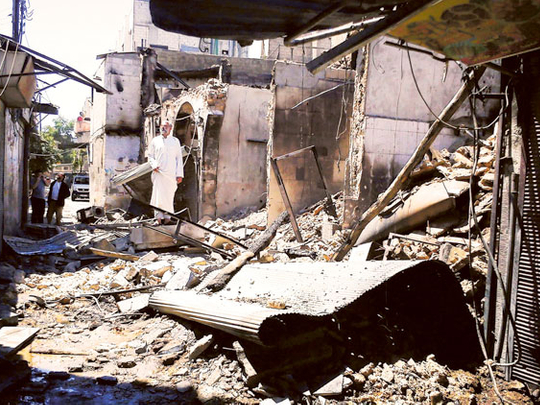
Beirut: Syrian rebel forces are stretching the Syria army nationwide, grabbing border posts and countryside regions as they challenge the regime in its symbolic power centres of Damascus and Aleppo, experts say.
An attack in the heart of Damascus last week, claimed by the rebel Free Syrian Army, killed four senior regime members and forced the government to redeploy troops to the capital, leaving gaps elsewhere that the rebels can exploit.
“There’s no doubt that they have to secure the capital,” British military expert Paul Smyth said of the government.
“The regime is undoubtedly becoming thinner and thinner and is more thinly spread,” added Smyth, director of the British firm R31 Consulting.
“There’s no doubt the momentum is with the rebels,” he added. “The amount of violence, the geographic spread of violence, the arms that are available to the rebels, has increased over the past two months.”
Joseph Holliday, an analyst at the Institute for the Study of War, agreed, pointing out that redeployments to Damascus had left the regime vulnerable elsewhere in the country.
“This contraction is what has caused the rebels’ ability to seize and hold border crossing points,” he said, referring to several posts on the Turkish and Iraqi borders claimed by opposition fighters.
“The regime will continue to contract inwards towards Damascus... and the rebels will increasingly control the periphery” of the country, he forecast.
Riad Kahwaji, director for the Institute for Near East and Gulf Military Analysis, said the regime’s ability to marshal its troops was increasingly in doubt.
“Not all the units are loyal, and these loyal units have become overstretched,” he said.
And as the regime throws its full weight into protecting its control over the capital, the rebels have made a tactical retreat there, instead “directing their full force on Aleppo,” Syria’s second city.
“Taking Aleppo after they take control of the borders of Turkey makes sense because it’s all connected, close to supply routes, close to the command headquarters of the rebels on the borders,” he said.
“I think they now are moving to implement the idea of having safe zone in the area, holding Aleppo and Idlib, and that could extend into the Kurdish areas, you see the Kurds beginning to move.”
But Anthony Cordesman, a military expert at the Washington-based Centre for Strategic and International Studies, cautioned against reading a nationwide strategy into the local tactics of disparate rebel cells.
“We don’t know frankly whether Aleppo is a strategy from one major faction of the insurgents, whether its a reaction to success in Damascus, whether it simply represents an obvious target that hasn’t been attacked because the insurgents felt they were too weak or not properly supplied and equipped.”
And Smyth warned that the regime was likely to fight hard to prevent the rebels from capturing Aleppo, or any similarly large city.
“They have to deny the rebels a Benghazi,” he said, referring to the eastern city that became a stronghold for rebels in Libya’s uprising.
He also said it was too early to talk of the notion of a safe zone along the border and that the capture of crossing posts was largely symbolic.
“I doubt the regime was waiting for convoys of supplies to drive up through Iraq,” he noted.
Still, there was broad agreement that the rebels are growing in numbers and firepower, while the Syrian army “is eroding” because of defections, as it faces new battlefront.
And Cordesman noted that the localised strategy of the rebel forces could work in their favour, making it harder for the government to devise a comprehensive plan to defeat them.
“You have sophisticated attacks in some areas, blunders in others, opportunistic actions,” he said.
“Every faction can look for targets of opportunity and if that target of opportunity proves to be a political or military success, then other insurgent groups can follow.”
And, he said, for the rebels to ultimately succeed, a prolonged series of such dispersed attacks — particularly where they draw massive regime responses in civilian areas — could be enough.
“If the regime becomes more and more unpopular, if it becomes less and less clear that the regime can trust the armed forces, insurgents don’t have to decisively defeat the government forces,” he said.
“They simply have to create a situation where the leadership feels that staying is untenable.”












